
:
January 7
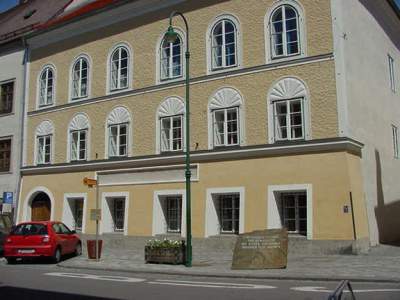
1885 Marriage: Alois Hitler legally weds Klara Poelzl: That evening there is a wedding reception at the Gasthof zum Pommer, where the Hitlers are living. The two children, Alois II and Angela, are at the wedding, and Klara's sister, Johanna, and two customs men are witnesses. After going off to work as usual (Klara: "We were married at six o'clock in the morning, and my husband was already at work by seven."), the reception is held after Alois returns home that night. A 'new maid'—who planned the ceremony and reception—is teased by the groom for stoking the fire too high and overheating the place. The couple have no honeymoon. [For further details, Click here.]
1903 Birth: Albrecht Haushofer: Son of Karl Haushofer, with close ties to members of the British aristocracy. Often associated with Rudolf Hess. Killed after the July 20, 1944 assassination attempt against Hitler.
1915 World War I: Bolshevik envoy approaches German ambassador in Turkey:
As Bolshevik groups work to foment revolution among Russia's peasants, Alexander Helphand, a wealthy Bolshevik businessman working as a German agent, approaches the German ambassador to Turkey in Constantinople to let him know how closely German and Bolshevik interests are aligned.
The interests of the German government are identical with those of the Russian revolutionaries, Helphand claimed. The Bolsheviks were working feverishly to destroy the czarist regime and break the country into smaller socialist republics. At the same time, Germany was depending on a major upheaval within Russia to break the stalemate on the Eastern Front and push the immense but volatile country toward peace negotiations with the Germans. Helphand persuaded the German Foreign Ministry that a mass strike was the key to revolution in Russia—and that Germany should lend a hand to the Bolsheviks in their efforts to engineer that strike.
The conversation marked the beginning of Germany's growing interest in the fomentation of the Russian revolution—an interest that culminated in their facilitation, in April 1917, of the return of exiled Bolshevik leader Vladimir Lenin from Switzerland to Petrograd in a train that passed over German soil. His journey was the result of efforts made by the German foreign secretary, Arthur Zimmermann, to convince the Kaiser and the army that Lenin's presence was paramount to the success of revolution in Russia—a revolution Germany should support despite the inherent threat Marxism posed to imperial regimes like the Kaiser's. Germany did not have to wait long to see the results of its investment. In November 1917 Lenin and the Bolsheviks seized power. Barely a month later, Russia sought peace with Germany. (History.com)
1916 World War I: War at Sea: Germany notifies the US State Department that it will abide by strict international rules of maritime warfare.
1918 World War I: After defeating the Russians, the Germans move 75,000 troops from the Eastern Front to the Western Front.
1919 Bolsheviks: Jan 7—14 William H. Buckler, US Embassy counselor in London, is sent by President Wilson to confer with Maxim Litvinov and other Soviet (Bolshevik) emissaries in Stockholm.
1922 Ireland: Anglo-Irish Treaty is narrowly approved by the Dail Eireann, ending the Irish War of Independence and establishing the Irish Free State, a self-governing dominion within the British Empire. [Note: This status did not last very long, until Eire became an independent republic, outside the Empire.]
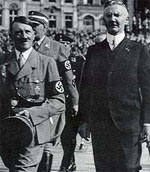
1931 Weimar: Hjalmar Schacht meets with Hitler for the first time and is impressed by Hitler's eloquence and absolute conviction. Before long, Schacht begins telephoning politicians, urging that the National Socialists be incorporated into a coalition government.
1934 Various:
Holocaust: Germany bars 'non-Aryans' from adopting 'Aryan' children.
Church and Reich: Six-thousand pastors in Berlin defy the Nazis, insisting that they will not be muzzled.
1935 Colonies: An agreement is signed between France and Italy adjusting their conflicting aims in Africa.
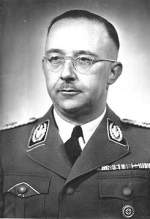
1941 Holocaust: Himmler writes to Seyss-Inquart, inviting him to Wewelsburg castle to discuss "Many important and ultimate matters."
1942 World War II: Various:
The Arcadia Conference comes to an end: This is the first get-together among the Allies since Pearl Harbor. During the proceedings each of the 26 signatory nations agreed to use all of their military and economic resources to defeat the Axis, pledging not to make a separate peace or armistice with the enemy.
Holocaust: From the Warsaw Ghetto Diary of Adam Czerniakow:
I suggested that he approach the higher authorities and request the release of the condemned men [in the Jewish prison]. It would be recompense for the furs that were supplied. I emphasized that I had asked for an additional food ration on those grounds, but that I would rather do without the food if there were a chance of saving so many people. I added that ordinarily the chain of official command runs from the Commissar to the Governor and from him to the Governor General. The Commissar replied that only the governor had the authority to order persons released. I therefore asked him in the name of humanity he submit suitable proposal. [For further details, Click here.]
Far East: The siege of Bataan begins. (AP)
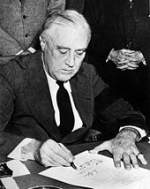
1943 World War II: President Roosevelt delivers his Tenth State of the Union Message saying, "I do believe the year of 1943 will give the United Nations a very substantial advance along the roads that lead to Berlin and Rome and Tokyo."
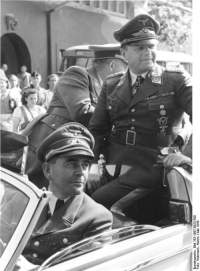
1944 World War II: Albert Speer and Field Marshal Erhard Milch meet with Hitler at his headquarters: The Fuehrer informs them that analysis of English periodicals reveals that the English are near to achieving success in the testing of experimental jet aircraft. Hitler demands that production of the Me 262, the Germans' turbojet fighter aircraft, be put on top priority. [See: Wunderwaffen: Hitler's Deception and the History of Rocketry.]
1945 World War II: Various:

Stalin to Churchill:
I received your message of January 6, 1945 on the evening of January 7 . . . . It is most important that we should be able to take advantage of our supremacy over the Germans in artillery and in the air. This demands clear flying weather and an absence of low mists, which hinder aimed artillery fire. We are preparing an offensive, but the weather is at present unfavorable. Nevertheless, taking into account the position of our Allies on the Western Front, G.H.Q. of the Supreme Command has decided to accelerate the completion of our preparation, and, regardless of the weather, to commence large-scale operations against the Germans along the whole central front not later than the second part of January. You may rest assured that we shall do everything possible to render assistance to the glorious forces of our Allies.
Hungary: Arrow Cross terror squads attack Swedish "protective houses" in Budapest.

William Joyce—aka Lord Haw-Haw—reports total German victory in the Ardennes.
World War II: Monty holds a press conference:
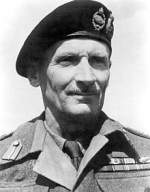
On this day, British Gen. Bernard Montgomery gives a press conference in which he all but claims complete credit for saving the Allied cause in the Battle of the Bulge. He was almost removed from his command because of the resulting American outcry.
On December 16, 1944, the Germans attempted to push the Allied front line west from northern France to northwestern Belgium. The Battle of the Bulge (so-called because the Germans, in pushing through the American defensive line, created a "bulge" around the area of the Ardennes forest) was the largest battle fought on the Western front. The German assault came in early morning at the weakest part of the Allied line, an 80-mile stretch of poorly protected, hilly forest that the Allies believed was too difficult to traverse, and therefore an unlikely location for a German offensive. Between the vulnerability of the thin, isolated American units and the thick fog that prevented Allied air cover from discovering German movement, the Germans were able to push the Americans into retreat.
Fresh from commanding the 21st Army group during the Normandy invasion, and having suffered an awful defeat in September as his troops attempted to cross the Rhine, Montgomery took temporary command of the northern shoulder of American and British troops in the Ardennes. He immediately fell into a familiar pattern, failing to act spontaneously for fear of not being sufficiently prepared. Montgomery was afraid to move before the German army had fully exhausted itself, finally making what American commanders saw as only a belated counterattack against the enemy. As the weather improved, American air cover raided German targets on the ground, which proved the turning point in the Allied victory. Monty eventually cut across northern Germany all the way to the Baltic and accepted the German surrender in May.
Montgomery had already earned the ire of many American officers because of his cautiousness in the field, arrogance off the field, and willingness to disparage his American counterparts. The last straw was Montgomery's whitewashing of the Battle of the Bulge facts to assembled reporters in his battlefield headquarters—he made his performance in the Ardennes sound not only more heroic but decisive, which necessarily underplayed the Americans' performance. Since the loss of American life in the battle was tremendous and the surrender of 7,500 members of the 106th Infantry humiliating, Gen. Omar Bradley complained loudly to Dwight D. Eisenhower, who passed the complaints on to Churchill. On January 18, Churchill addressed Parliament and announced in no uncertain terms that the "Bulge" was an American battle—and an American victory. (History.com)
1953 Cold War: Truman announces U.S. has developed hydrogen bomb:

In his final State of the Union address before Congress, President Harry S. Truman tells the world that that the United States has developed a hydrogen bomb.
It was just three years earlier on January 31, 1950, that Truman publicly announced that had directed the Atomic Energy Commission to proceed with the development of the hydrogen bomb. Truman's directive came in responds to evidence of an atomic explosion occurring within USSR in 1949. (History.com)
1959 Cold War: United States recognizes new Cuban government: Just six days after the fall of the Fulgencio Batista dictatorship in Cuba, U.S. officials recognize the new provisional government of the island nation. Despite fears that Fidel Castro, whose rebel army helped to overthrow Batista, might have communist leanings, the U.S. government believed that it could work with the new regime and protect American interests in Cuba. [For further information, click here.]
1979 Far East: Vietnamese forces capture the Cambodian capital of Phnom Penh, overthrowing the Khmer Rouge government. (AP)
1989 Death: Emperor Hirohito:
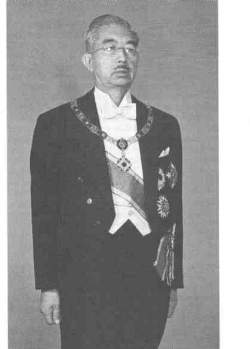
Showa Tenno Hirohito, the 124th Japanese monarch in an imperial line dating back to 660 B.C., dies after serving six decades as the emperor of Japan. He was the longest serving monarch in Japanese history.
Made regent in 1921, Hirohito was enthroned as emperor in 1928, two years after the death of his father, Emperor Taisho. During his first two decades as emperor, Hirohito presided over one of the most turbulent eras in his nation's history. From rapid military expansion beginning in 1931 to the crushing defeat of Japan in 1945, Hirohito stood above the Japanese people as an absolute monarch whose powers were sharply limited in practice. After U.S. atomic bombs destroyed Hiroshima and Nagasaki, it was he who argued for his country's surrender, explaining to the Japanese people in his first-ever radio address that the "unendurable must be endured." Under U.S. occupation and postwar reconstruction, Hirohito was formally stripped of his powers and forced to renounce his alleged div (History.com)inity, but he remained his country's official figurehead until his death in 1989. He was succeeded as emperor by his only son, Akihito.
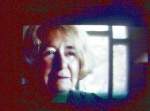
1994 Albert Speer's daughter: Hilde Schramm, a prominent European political figure who has distinguished herself by helping victims of anti-Semitism and Nazi atrocities, is awarded the Moses Mendelssohn Award. Note: Schramm is active in German politics, has served as vice president of the Berlin city council, and is a leader of the Green Party in Berlin.
Edited by Levi Bookin (Copy editor)
levi.bookin@gmail.com
FAIR USE NOTICE: This site may contain copyrighted material the use of which has not always been specifically authorized by the copyright owner. We are making such material available in our efforts to advance understanding of historical, political, human rights, economic, democracy, scientific, environmental, and social justice issues, etc. We believe this constitutes a 'fair use' of any such copyrighted material as provided for in section 107 of the US Copyright Law. In accordance with Title 17 U.S.C. Section 107, the material on this site is distributed without profit to those who have expressed a prior interest in receiving the included information for research and educational purposes. If you wish to use copyrighted material from this site for purposes of your own that go beyond 'fair use', you must obtain permission from the copyright owner.
Please note that the list-owner and the moderators are not responsible for, and do not necessarily approve of, the random ads placed on our pages by our web server. They are, unfortunately, the price one pays for a 'free' website.